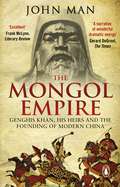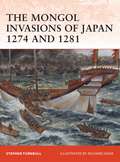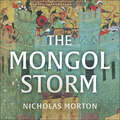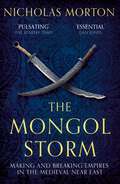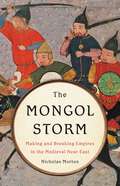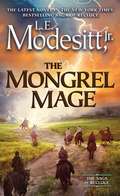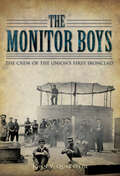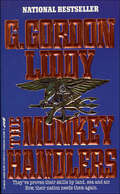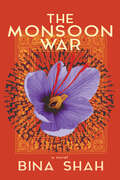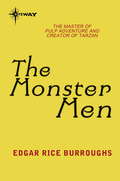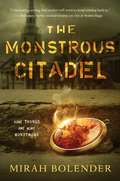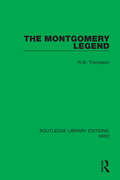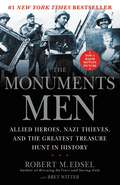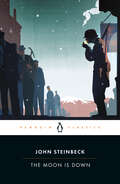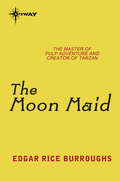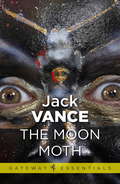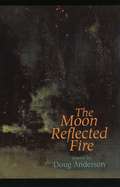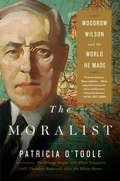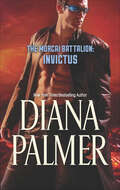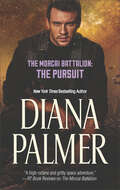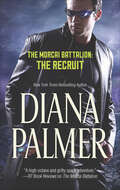- Table View
- List View
The Mongol Empire: Genghis Khan, his heirs and the founding of modern China
by John ManGenghis Khan is one of history's immortals: a leader of genius, driven by an inspiring vision for peaceful world rule. Believing he was divinely protected, Genghis united warring clans to create a nation and then an empire that ran across much of Asia.Under his grandson, Kublai Khan, the vision evolved into a more complex religious ideology, justifying further expansion. Kublai doubled the empire's size until, in the late 13th century, he and the rest of Genghis’s ‘Golden Family’ controlled one fifth of the inhabited world. Along the way, he conquered all China, gave the nation the borders it has today, and then, finally, discovered the limits to growth.Genghis's dream of world rule turned out to be a fantasy. And yet, in terms of the sheer scale of the conquests, never has a vision and the character of one man had such an effect on the world.Charting the evolution of this vision, John Man provides a unique account of the Mongol Empire, from young Genghis to old Kublai, from a rejected teenager to the world’s most powerful emperor.
The Mongol Invasions of Japan 1274 and 1281
by Stephen Turnbull Richard HookThe two attempts by Khubilai Khan, the Mongol Emperor of China, to invade Japan in 1274 and 1281 represent unique events in the history of both countries. It pitted the samurai of Japan against the fierce warriors of the steppes who had conquered half the known world.The Mongol conquest of Korea left them with a considerable quantity of maritime resources, which enabled them to thin seriously for the first time about crossing the Tsushima strait between Korea and Japan with an army of invasion. The first invasion, which began with savage raiding on the islands of Tsushima and Iki, made a landfall at Hakata Bay and forced the samurai defenders back inland. Luckily for the Japanese defenders, a storm scattered the Mongol invasion fleet, leading them to abandon this attempt. In the intervening years the Japanese made defensive preparation, and the Mongol increased their fleet and army, so that the second invasion involved one of the largest seaborne expeditions in world history up to that time. This attempt was aimed at the same landing site, Hakata Bay, and met stiffer opposition form the new defences and the aggressive Japanese defenders. Forced buy a series of major Japanese raids to stay in their ships at anchor, the Mongol fleet was obliterated by a typhoon - the kami kaze (divine wind) - for the loss of as many as 90 per cent of the invaders. Although further preparations were made for an assault by the Mongols at the end of the 13ht and beginning of the 14th centuries, this proved to be the last realistic threat of an invasion of the home islands till 1945.
The Mongol Storm: Making and Breaking Empires in the Medieval Near East
by Nicholas MortonHow the Mongol invasions of the Near East reshaped the balance of world power in the Middle Ages. For centuries, the Crusades have been central to the story of the medieval Near East, but these religious wars are only part of the region's complex history. As The Mongol Storm reveals, during the same era the Near East was utterly remade by another series of wars: the Mongol invasions. In a single generation, the Mongols conquered vast swaths of the Near East and upended the region's geopolitics. Amid the chaos of the Mongol onslaught, long-standing powers such as the Byzantines, the Seljuk Turks, and the crusaders struggled to survive, while new players such as the Ottomans arose to fight back. The Mongol conquests forever transformed the region, while forging closer ties among societies spread across Eurasia. This is the definitive history of the Mongol assault on the Near East and its enduring global consequences.(P) 2022 Hodder & Stoughton Limited
The Mongol Storm: Making and Breaking Empires in the Medieval Near East
by Nicholas Morton'Deeply researched and elegantly written - essential reading' Dan JonesHow the Mongol invasions of the Near East reshaped the balance of world power in the Middle Ages. For centuries, the Crusades have been central to the story of the medieval Near East, but these religious wars are only part of the region's complex history. As The Mongol Storm reveals, during the same era the Near East was utterly remade by another series of wars: the Mongol invasions. In a single generation, the Mongols conquered vast swaths of the Near East and upended the region's geopolitics. Amid the chaos of the Mongol onslaught, long-standing powers such as the Byzantines, the Seljuk Turks, and the crusaders struggled to survive, while new players such as the Ottomans arose to fight back. The Mongol conquests forever transformed the region, while forging closer ties among societies spread across Eurasia. This is the definitive history of the Mongol assault on the Near East and its enduring global consequences.
The Mongol Storm: Making and Breaking Empires in the Medieval Near East
by Nicholas MortonHow the Mongol invasions of the Near East reshaped the balance of world power in the Middle Ages For centuries, the Crusades have been central to the story of the medieval Near East, but these religious wars are only part of the region&’s complex history. As The Mongol Storm reveals, during the same era the Near East was utterly remade by another series of wars: the Mongol invasions. In a single generation, the Mongols conquered vast swaths of the Near East and upended the region&’s geopolitics. Amid the chaos of the Mongol onslaught, long-standing powers such as the Byzantines, the Seljuk Turks, and the crusaders struggled to survive, while new players such as the Ottomans arose to fight back. The Mongol conquests forever transformed the region, while forging closer ties among societies spread across Eurasia. This is the definitive history of the Mongol assault on the Near East and its enduring global consequences.
The Mongrel Mage (Saga of Recluce #19)
by L. E. Modesitt Jr.The Saga of Recluce chronicles the history of this world with world-building detail and an ingenious and disciplined magic system. L. E. Modesitt, Jr. returns to his longest and bestselling fantasy series with volume nineteen, The Mongrel Mage, which marks the beginning of a new story arc. In the world of Recluce, powerful mages can wield two kinds of magic—the white of Chaos or the black of Order. Beltur, however, has talents no one dreamed of, talents not seen in hundreds of years that blend both magics. On the run from a power hungry white mage, Beltur is taken in by Order mages who set him on the path to discover and hone his own unique gifts and in the process find a home.However, when the white mage he fled attempts to invade his new home, Beltur must hope his new found power will be enough to save them all. Saga of Recluce #1 The Magic of Recluce / #2 The Towers of the Sunset / #3 The Order War / #4 The Magic Engineer / #5 The Death of Chaos / #6 Fall of Angels / #7 The Chaos Balance / #8 The White Order / #9 Colors of Chaos / #10 Magi’i of Cyador / #11 Scion of Cyador / #12 Wellspring of Chaos / #13 Ordermaster / #14 Natural Order Mage / #15 Mage-Guard of Hamor / #16 Arms-Commander / #17 Cyador’s Heirs / #18 Heritage of Cyador / #19 The Mongrel Mage Story Collection: Recluce Tales Other Series by L.E. Modesitt, Jr. The Imager Portfolio, The Corean Chronicles, The Spellsong Cycle, The Ghost Books, The Ecolitan Matter At the Publisher's request, this title is being sold without Digital Rights Management Software (DRM) applied.
The Monitor Boys: The Crew of the Union's First Ironclad (Civil War Series)
by John V QuarsteinThe stories of the officers and crew who served aboard the ironclad warship up until that fateful stormy New Year&’s Eve in 1862. The United States Navy&’s first ironclad warship rose to glory during the Battle of Hampton Roads on March 9, 1862, but there's much more to know about the USS Monitor. Historian John Quarstein has painstakingly compiled bits of historical data gathered through years of research to present the first comprehensive picture of the lives of the officers and crew who served faithfully in an iron ship unlike any vessel previously known. &“The Monitor Boys,&” a moniker the men gave themselves, is a reflection of how these hundred-odd souls were bound together through storms, battles, boredom, and disaster. Just living aboard the ironclad took uncommon effort and fortitude. Their perseverance through the heat, stress, and unseaworthiness that defined life on the ship makes the study of those who dared it a worthy endeavor. Many recognized that they were part of history. Moreover, the Monitor Boys were agents in the change of naval warfare. Following Quarstein&’s compelling narrative is a detailed chronology as well as appendices including crew member biographies, casualties, and statistics and dimensions of the ship. Readers can dive into the world of the Monitor and meet William Flye, George Geer, and the rest of the men who risked everything by going to sea in the celebrated &“cheesebox on a raft&” and became the hope of a nation wracked by war. Includes illustrations
The Monkey Handlers
by G. Gordon LiddyThe brave, the proud, the damned... Sara Rosen: Dark, impulsive beauty-- her radical acts on behalf of animal rights land her in terrible danger.... Michael Stone: He kept the tools of his former trade closed up in a trunk. Now he must open his SEAL war chest-- to strike at the heart of international terrorism. Al Rajul: He's never been photographed or identified. Now he has the weapon he's been looking for-- to spread horror and death through the heart of the United States... in The Monkey Handlers by G. Gordon Liddy.
The Monsoon War: A Novel
by Bina ShahThe acclaimed author of Before She Sleeps returns to a feminist dystopia in this novel of women rising up to break the bonds of polygamy and repression. In a country bent on controlling women&’s bodily autonomy and reproductive freedom, a resistance has formed. An armed group of women known as the Hamiyat have made a name for themselves protecting those too weak to fight back. And now they are going on the offensive . . . Three women among its ranks must make the hardest choices of their lives. Alia Musa, wife of three husbands, joins the Hamiyat to stand up for the daughters she loves. Young soldier Katy Azadeh is kidnapped and finds her beliefs sorely tested by the country of Eastern Semitia and its seductive promises, while commander Fatima Kara must weigh the balance of her soldiers&’ lives against a once-in-a-lifetime gambit for freedom. Called &“a haunting, dystopian thriller . . . [that] fans of The Handmaid&’s Tale won&’t want to miss,&” Before She Sleeps was just the beginning, awakening readers to an all-too-believable future (Publishers Weekly, starred review). Now The Monsoon War will take you to the front lines of a desperate battle against a government standing on the necks of the women they thought were broken. &“A cinematic mashup of spy tale, geopolitical [science-fiction], and war epic.&” —Kirkus Reviews &“Betrayals, reversals, action and nail-biting suspense make for an addictive story . . . and the characters and their incandescent fellowship will keep you obsessed.&” —The Washington Post Praise for Before She Sleeps &“Female-centered #Dystopia from #Pakistan: Before She Sleeps, Bina Shah. Fascinating new angle on &‘emotional work&’!&” —Margaret Atwood on Twitter &“The most subtly disturbing of dystopias, richly textured and appallingly intimate, Before She Sleeps has hints of Huxley and Atwood but is uniquely Bina Shah.&” —Nick Harkaway, author of Gnomon
The Monster Men
by Edgar Rice BurroughsThey called him Number Thirteen, the latest and best of Dr. Von Horn's attempts to make life from lifeless chemicals. He found himself an almost-human on Von Horn's hideaway jungle island off the coast of Borneo. He saw the monsters that had preceded him and grew used to those dreadful travesties of humanity. Not until Number Thirteen met the American girl who was Von Horn's unwilling prisoner did he realize how different he was from the others. Because, monster or not, he turned against his master and threw in his lot with the girl and his friends in their desperate effort to escape the island of terror. The story of THE MONSTER MEN is an Edgar Rice Burroughs novel of savages, primitive monsters and jungles in the best Tarzan style.
The Monstrous Citadel (Chronicles of Amicae #2)
by Mirah BolenderThe Monstrous Citadel is the sequel to Mirah Bolender's City of Broken Magic—a fast-paced, adventure fantasy where a bomb squad defuses the magic weapons of a long forgotten war.Polygon—17 New Science Fiction and Fantasy Books to Check Out This NovemberAmicae, City of Sweepers, survived the Falling Infestation which nearly destroyed it thanks to the efforts of Laura and Okane. While the ancient monsters have been beaten back for the moment, new and more monstrous dangers face them in the form of belligerent bureaucracy, dangerous gangs, grasping Sweepers bent on personal glory . . .And Rex, the City of Kings, who breed their own kind of monstrosity. Laura and Okane must go to Rex to reclaim the secret weaponry that keeps Amicae safe and come face to face with a horrifying truth about the Rex and their designs on all of Orien's cities.Chronicles of AmicaeCity of Broken MagicThe Monstrous CitadelAt the Publisher's request, this title is being sold without Digital Rights Management Software (DRM) applied.
The Montgomery Legend (Routledge Library Editions: WW2 #18)
by R.W. ThompsonThis book, first published in 1967, examines the foundations and the substance of the Montgomery Legend. His appearance upon the scene in the Western Desert coincided with a change in warfare as ‘ironmongery replaced generalship’, as General Fuller observed, and with Montgomery’s victories came a British need for a Champion for all to see. The public needed a Hero as Britain’s time on the ropes ended, and it was also politically necessary, lest Britain be swamped by the power of its allies.
The Monuments Men: Allied Heroes, Nazi Thieves, and the Greatest Treasure Hunt in History
by Bret Witter Robert M. EdselAt the same time Adolf Hitler was attempting to take over the western world, his armies were methodically seeking and hoarding the finest art treasures in Europe. The Fuehrer had begun cataloguing the art he planned to collect as well as the art he would destroy: "degenerate" works he despised. In a race against time, behind enemy lines, often unarmed, a special force of American and British museum directors, curators, art historians, and others, called the Momuments Men, risked their lives scouring Europe to prevent the destruction of thousands of years of culture. Focusing on the eleven-month period between D-Day and V-E Day, this fascinating account follows six Monuments Men and their impossible mission to save the world's great art from the Nazis.
The Moon Gate: A sweeping tale of love, war and a house of secrets for fans of historical fiction NEW for 2023
by Amanda GeardA faded photograph. An abandoned house. A wartime secret . . .From the author of the Richard and Judy Book Club pick The Midnight House, a mesmerising story of love, war, and a mystery that ensnares three generations, sweeping the reader from London to Tasmania and to Ireland. Perfect for fans of Kate Morton, Lucinda Riley and Eve Chase.'A rich, sweeping mystery . . . beautifully written, atmospheric and intriguing' Tracy Rees, author of The Elopement'Magnificent! Cleverly woven plots, storylines and heartbreak . . . I loved it' Lorna Cook, bestselling author of The Forgotten Village'A richly layered atmospheric story that transports the reader . . . I was drawn in from the first page' Jacquie Bloese, author of The French House'Divine . . . I relished every single word of this heart-rending story, full of love and sacrifice' Jenny Ashcroft, bestselling author of Beneath a Burning Sky-----1939: On the eve of war, young English heiress Grace Grey travels from London to the wilderness of Tasmania. Coaxed out of her shell by the attentions of her Irish neighbour, Daniel - Grace finally learns to live. But when Australian forces are called to the frontline, and Daniel with them, he leaves behind a devastating secret which will forever bind them together.1975: Artist Willow Hawkins, and her new husband, Ben, can't believe their luck when an anonymous benefactor leaves them a house on the remote Tasmanian coast. Confused and delighted, they set out to unmask Towerhurst's previous owner - unwittingly altering the course of their lives.2004: Libby Andrews has always been sheltered from the truth behind her father Ben's death. When she travels to London and discovers a faded photograph, a long-buried memory is unlocked, and she begins to follow an investigation that Ben could never complete. But will she realise that some secrets are best left buried . . .?------YOUR FAVOURITE AUTHORS LOVE AMANDA GEARD . . . 'I loved The Midnight House. Wonderful storytelling' RACHEL HORE'A wonderful tale of family secrets, brimming with lush historical detail' HAZEL GAYNOR'A multi-layered mystery spanning generations, evocative and beautifully written' TRACY REES'I loved it. An intriguing story with wonderful characters' RACHAEL ENGLISH'I really, really loved it. A wonderful mystery. Totally atmospheric and just wonderfully escapist' LORNA COOK'A gorgeous setting, wonderful characters and secrets that kept me glued to the pages' JENNY ASHCROFT'I was pulled in from page one. It's beautiful and I love it' LIZ FENWICK'Intriguing, moving and I loved the wat the stories moved back and forth in time' SINEAD MORIARTY
The Moon Gate: A sweeping tale of love, war and a house of secrets for fans of historical fiction NEW for 2023
by Amanda GeardA faded photograph. An abandoned house. A wartime secret . . .From the author of the Richard and Judy Book Club pick The Midnight House, a mesmerising story of love, war, and a mystery that ensnares three generations, sweeping the reader from London to Tasmania and to Ireland. Perfect for fans of Kate Morton, Lucinda Riley and Eve Chase.'A rich, sweeping mystery . . . beautifully written, atmospheric and intriguing' Tracy Rees, author of The Elopement'Magnificent! Cleverly woven plots, storylines and heartbreak . . . I loved it' Lorna Cook, bestselling author of The Forgotten Village'A richly layered atmospheric story that transports the reader . . . I was drawn in from the first page' Jacquie Bloese, author of The French House'Divine . . . I relished every single word of this heart-rending story, full of love and sacrifice' Jenny Ashcroft, bestselling author of Beneath a Burning Sky-----1939: On the eve of war, young English heiress Grace Grey travels from London to the wilderness of Tasmania. Coaxed out of her shell by the attentions of her Irish neighbour, Daniel - Grace finally learns to live. But when Australian forces are called to the frontline, and Daniel with them, he leaves behind a devastating secret which will forever bind them together.1975: Artist Willow Hawkins, and her new husband, Ben, can't believe their luck when an anonymous benefactor leaves them a house on the remote Tasmanian coast. Confused and delighted, they set out to unmask Towerhurst's previous owner - unwittingly altering the course of their lives.2004: Libby Andrews has always been sheltered from the truth behind her father Ben's death. When she travels to London and discovers a faded photograph, a long-buried memory is unlocked, and she begins to follow an investigation that Ben could never complete. But will she realise that some secrets are best left buried . . .?------YOUR FAVOURITE AUTHORS LOVE AMANDA GEARD . . . 'I loved The Midnight House. Wonderful storytelling' RACHEL HORE'A wonderful tale of family secrets, brimming with lush historical detail' HAZEL GAYNOR'A multi-layered mystery spanning generations, evocative and beautifully written' TRACY REES'I loved it. An intriguing story with wonderful characters' RACHAEL ENGLISH'I really, really loved it. A wonderful mystery. Totally atmospheric and just wonderfully escapist' LORNA COOK'A gorgeous setting, wonderful characters and secrets that kept me glued to the pages' JENNY ASHCROFT'I was pulled in from page one. It's beautiful and I love it' LIZ FENWICK'Intriguing, moving and I loved the wat the stories moved back and forth in time' SINEAD MORIARTY
The Moon Gate: A sweeping tale of love, war and a house of secrets for fans of historical fiction NEW for 2023
by Amanda GeardA faded photograph. An abandoned house. A wartime secret . . .From the author of the Richard and Judy Book Club pick The Midnight House, a mesmerising story of love, war, and a mystery that ensnares three generations, sweeping the reader from London to Tasmania and to Ireland. Perfect for fans of Kate Morton, Lucinda Riley and Eve Chase.1939: On the eve of war, young English heiress Grace Grey travels from London to the wilderness of Tasmania. Coaxed out of her shell by the attentions of her Irish neighbour, Daniel - Grace finally learns to live. But when Australian forces are called to the frontline, and Daniel with them, he leaves behind a devastating secret which will forever bind them together.1975: Artist Willow Hawkins, and her new husband, Ben, can't believe their luck when an anonymous benefactor leaves them a house on the remote Tasmanian coast. Confused and delighted, they set out to unmask Towerhurst's previous owner - unwittingly altering the course of their lives.2004: Libby Andrews has always been sheltered from the truth behind her father Ben's death. When she travels to London and discovers a faded photograph, a long-buried memory is unlocked, and she begins to follow an investigation that Ben could never complete. But will she realise that some secrets are best left buried . . .?------YOUR FAVOURITE AUTHORS LOVE AMANDA GEARD . . . 'I loved The Midnight House. Wonderful storytelling' RACHEL HORE'A wonderful tale of family secrets, brimming with lush historical detail' HAZEL GAYNOR'A multi-layered mystery spanning generations, evocative and beautifully written' TRACY REES'I loved it. An intriguing story with wonderful characters' RACHAEL ENGLISH'I really, really loved it. A wonderful mystery. Totally atmospheric and just wonderfully escapist' LORNA COOK'Intriguing, moving and I loved the wat the stories moved back and forth in time' SINEAD MORIARTY(P) 2023 Headline Publishing Group Ltd
The Moon Is Down (Penguin Audio Classics Ser.)
by John Steinbeck Donald V. CoersOriginally published at the zenith of Nazi Germany's power, Steinbeck's fable THE MOON IS DOWN explores the effects of invasion on both the conquered and the conquerors. Occupied by enemy troops, a small, peaceable town comes face-to-face with evil imposed from the outside and betrayal from within the close-knit community. As he delves into the motivations and emotions of the enemy, Steinbeck uncovers profound and often unsettling truths both about war and human nature.
The Moon Maid
by Edgar Rice BurroughsIn the late twentieth century, Admiral Julian 3rd can get no rest, for he knows his future. He will be reborn as his grandson in the next century to journey through space and make an ominous discovery inside the moon; he will live again in the dark years of the twenty-second century as Julian 9th, who refuses to bow down to the victorious Moon Men; and as Julian 20th, the fierce Red Hawk, he will lead humanity's final battle against the alien invaders in the twenty-fifth century. The Moon Maid is Edgar Rice Burroughs's stunning epic of a world conquered by alien invaders from the moon and of the hero Julian, who champions the earth's struggle for freedom, peace, and dignity.
The Moon Moth and Other Stories (Gateway Essentials #206)
by Jack VanceWhen an out-worlder's body was found in the river, Thissel knew where the criminal was - behind one of the masks worn by the remaining out-worlders on Sirene. But how could he tell which one, on a world where everybody lived behind masks, where men never spoke but sang to instruments, and where any act of intervention with another man's business was punishable by death!
The Moon Reflected Fire
by Doug AndersonOf The Moon Reflected Fire and its subject, the Vietnam War, poet James Tate writes: "These are trenchant, wrenching poems. With artistry and honesty they perform an inquest into war and its corrosive after effects."
The Moon Represents My Heart
by Pim Wangtechawat'A beautiful exploration of family, love and loss across the generations. Fresh, fun... I didn't want it to end.' Gemma ChanHow far would you travel to find a love lost in time? 1927, East London. The first time Tommy and Peggy meet, they are nine years old. He is lost in London's original Chinatown, panicking as he struggles to escape the tangle of Limehouse streets, with their road signs in Chinese characters that he can't decipher. 'Where do you come from?' Peggy asks him. For Tommy, the answer to that question can never be straightforward, because his family share a secret gift: they can travel through time. And each must eventually decide how much the present day means to them, and how far they are willing to travel to hold onto the people they love. Heartfelt and hopeful, weaving through decades and across continents, The Moon Represents My Heart is an unforgettable debut about one extraordinary family, the gift that threatens to tear them apart and the love that binds them together. 'An immediately compelling, unusual story with a totally fresh voice.' Jennifer Saint, author of Ariadne
The Moralist: Woodrow Wilson and the World He Made
by Patricia O'Toole“O’Toole does full justice to Wilson’s complexities, but it is with the coming of the war that her narrative takes on something close to Shakespearean dimensions...scrupulously balanced...elegantly crafted.”—The Wall Street Journal “Enlightening...O’Toole has done students of American history a great service.”—National Review By the author of acclaimed biographies of Theodore Roosevelt and Henry Adams, a penetrating biography of one of the most high-minded, consequential, and controversial US presidents, Woodrow Wilson (1856-1924). The Moralist is a cautionary tale about the perils of moral vanity and American overreach in foreign affairs.In domestic affairs, Wilson was a progressive who enjoyed unprecedented success in leveling the economic playing field, but he was behind the times on racial equality and women’s suffrage. As a Southern boy during the Civil War, he knew the ravages of war, and as president he refused to lead the country into World War I until he was convinced that Germany posed a direct threat to the United States. Once committed, he was an admirable commander-in-chief, yet he also presided over the harshest suppression of political dissent in American history. After the war Wilson became the world’s most ardent champion of liberal internationalism—a democratic new world order committed to peace, collective security, and free trade. With Wilson’s leadership, the governments at the Paris Peace Conference in 1919 founded the League of Nations, a federation of the world’s democracies. The creation of the League, Wilson’s last great triumph, was quickly followed by two crushing blows: a paralyzing stroke and the rejection of the treaty that would have allowed the United States to join the League. After a backlash against internationalism in the 1920s and 1930s, Wilson’s liberal internationalism was revived by Franklin D. Roosevelt and it has shaped American foreign relations—for better and worse—ever since.
The Morcai Battalion: Invictus (The Morcai Battalion #3)
by Diana PalmerA dangerous mission tests the relationship between a surly commander and a sassy doctor in this action-packed, romantic science fiction epic. For almost three years, Dtimun, the enigmatic and mysterious Cehn-Tahr commander of the Morcai Battalion, has been at war not only with the Rojok Dynasty . . . but also with his feisty medical chief of staff, Dr. Madeline Ruszel. Now a surprising visitor from the future has charged them with the rescue of the enemy, field marshal Chacon. To ensure success, both Madeline and Dtimun must make personal sacrifices and attempt a dangerous mission behind enemy lines. Sparks fly as each twist and turn throws them closer together than they've ever been before, but can they resist acting on desires they have long denied? If their plans are discovered, they face exile by their own governments and possibly even execution. If they do not act, the future will see the end of civilization itself . . . Praise for The Morcai Battalion: Invictus &“This futuristic romance is action-packed and will please fans of Marcella Burnard and Katherine Allred. Readers new to the series will enjoy Kyle's well-conceived universe and the different modes of government and acceptable social interaction that make for a wealth of possibilities in this tale.&” —RT Book Reviews
The Morcai Battalion: The Pursuit (The Morcai Battalion #5)
by Diana PalmerA doctor must work with the military commander she left broken hearted in this intergalactic tale of impossible love by a New York Times bestseller. The first time Mekashe, Captain of the Imperial Guard, meets blue-eyed human beauty Jasmine Donally, the two nearly come to blows. Forever devoted to the Cehn-Tahr, Mekashe is forced to sever ties with the object of his adoration. Years pass before their paths cross again, but Mekashe hasn&’t forgotten what transpired—or the way she makes his heart race. But even if he can forgive the past, insurmountable barriers still threaten to keep them worlds apart. With their mutual attraction escalating quickly, they&’ll have to find a way to bridge the gap—or be lost to each other forever. Praise for The Morcai Battalion: The Pursuit &“Palmer&’s futuristic, interspecies romance is a sweet story with a sad and tragic twist. Readers will truly wonder if these two protagonists will ever get past their differences and have the happy ending that they truly deserve.&” —RT Book Reviews
The Morcai Battalion: The Recruit (The Morcai Battalion #2)
by Diana PalmerA forbidden romance blossoms between a human combat surgeon and an alien military commander as they fight together for peace in this thrilling space epic. A prophecy foretold: Three years after the unprovoked attack on a peaceful colony, the war between the Rojok dynasty and the Tri-Galaxy Fleet rages on. Born of that war is the Morcai Battalion, a fleet comprised of Centaurians and humans—the first collaboration of its kind and a step toward an intergalactic alliance. But the fragile union is tested as their courageous commander in chief, Dtimun, is faced with the temptation of the forbidden—and human—Dr. Madeline Ruszel. A combat surgeon, Ruszel is aware of the danger of inciting a Centaurian&’s interest, even if he is the most intriguing of men. Besides putting their mission at risk, personal relations between their kinds are still outlawed. But a prophecy that touches on both their lives and the future of all alien nations hints that a greater unity may be theirs for the taking . . . if they, and their crew, survive in the battle for peace. Praise for Diana Palmer and her work&“A high-octane and gritty space adventure.&” —RT Book Reviews on The Morcai Battalion&“Fans of stark outer space military science fiction will appreciate this sobering at war thriller.&” —The Best Reviews on The Morcai Battalion&“Palmer . . . is the queen of desperado quests for justice and true love.&” —Publishers Weekly on Dangerous
